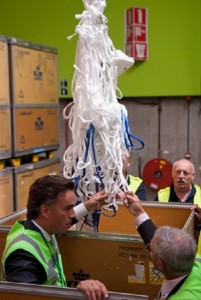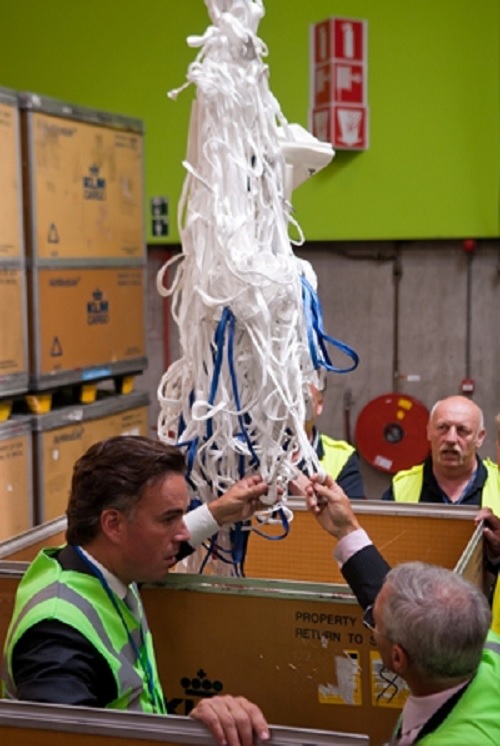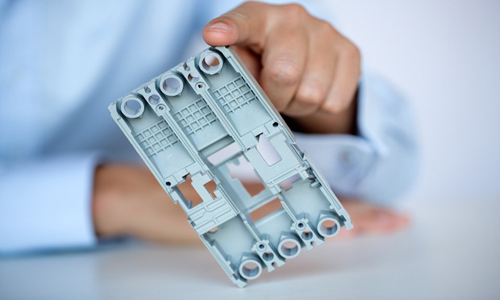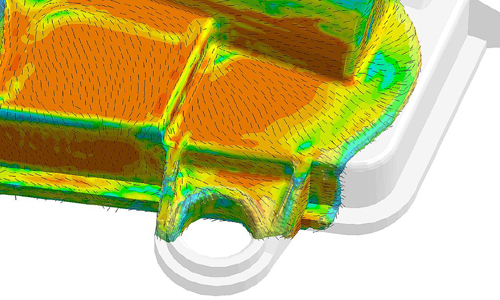The Netherlands, 9 July 2013 – Air France-KLM will further cut tonnes from its annual aircraft carbon dioxide emissions, simply by using revolutionary new lightweight cargo nets that it is now introducing. Just one new lightweight net with Dyneema® will save Air France-KLM-Martinair Cargo over 210 gallons of kerosene fuel per year.

That means CO2 emissions will be over 2.5 tonnes less per net per year.The first nets, made with ultra high molecular weight polyethylene (UHMwPE) fiber, manufactured by DSM Dyneema and branded as Dyneema® —were formally handed over at Schiphol airport in Amsterdam on July 9th.
Produced by AmSafe Bridport, world leader in aviation restraint technology, the nets will in future be used on all aircraft operated by Air France-KLM-Martinair Cargo, the dedicated air cargo business of the Air France-KLM Group. It is the first major airline group to replace all cargo pallet nets, normally made in polyester (PET) fiber, with lightweight nets made with Dyneema®.
Air France-KLM-Martinair Cargo, AmSafe Bridport and DSM have been collaborating on development and testing of the lightweight nets for several years. They have succeeded in producing nets that weigh around 9 kg, which is half the weight of a traditional net in PET fiber. Air France-KLM-Martinair Cargo has now recognized Amsafe Bridport and DSM as preferred suppliers of sustainable aircargo solutions.
This Tuesday (July 9), Atzo Nicolaï, President Netherland of DSM, and Ian Kentfield, President of AmSafe Bridport, handed over the first revolutionary lightweight cargo net to Camiel Eurlings, CEO of KLM.
“We are proud to be the first major airline group to introduce light weight nets with Dyneema®,” said Camiel Eurlings. “At Air France-KLM, we are fully committed to reduce our carbon footprint, and our efforts are being recognized. For the eighth year running, Air France KLM has come out at the top of the Dow Jones Sustainability Index in the airline sector.”
“Weight reduction on board our aircraft is an important part of those efforts. These lightweight nets can lead to important reductions in greenhouse gas emissions, and are the latest in a series of efforts we are taking to reduce our carbon footprint.”
Important too is the fact that lightweight nets with Dyneema® mean operatives can handle them more easily and safely. Furthermore, the nets are more damage-resistant than polyester nets, and so require around half as much maintenance, which is a significant saving. “That’s what I call a win-win-win situation,” concluded Eurlings.
AmSafe Bridport’s Ian Kentfield highlighted the collaborative efforts between the three companies that had made possible such an important step forward in reducing aircraft emissions. “Delivery of a new product to a customer requires a good in depth understanding of their needs and requirements,” he said.
“We have worked closely together for seven years to ensure this product meets Air France-KLM’s needs operationally, financially and aesthetically, and that it can fulfill the performance criteria of a cargo pallet net for its entire five- year lifetime—which is 60% longer than rival products.”
Atzo Nicolaï from DSM said that the new nets provided an excellent example of DSM’s use of “bright science to create brighter living,” and its spirit of collaboration with industry partners. “We are very proud that Dyneema®, with its characteristic very high strength and low weight, has such a great impact on the planet and on people, as well as our customers’ profit,” he said. “Sustainability is key, and the reductions in emissions that Air France-KLM will achieve are very impressive.”
About KLM
KLM Royal Dutch Airlines was founded in 1919, making it the world’s oldest airline still operating under its original name. In 2004, Air France and KLM merged to form AIR FRANCE KLM. The merger produced the strongest European airline group based on two powerful brands and hubs – Amsterdam Airport Schiphol and Paris Charles de Gaulle. Retaining its own identity, the group focuses on three core businesses: passenger transport, cargo and aircraft maintenance.
In the Netherlands, KLM comprises the core of the KLM Group, which further includes KLM Cityhopper, transavia.com and Martinair. KLM serves all its destinations using a modern fleet and employs over 33,000 people around the world. KLM is a leader in the airline industry, offering reliable operations and customer-oriented products resulting from its policy of enthusiasm and sustainable innovation.
KLM is a member of the global SkyTeam airline alliance, offering customers an extensive worldwide network. The KLM network connects the Netherlands to every important economic region in the world and, as such, serves as a powerful driver for the economy.
About AmSafe Bridport
AmSafe Bridport is the world leader in safety restraint products for the aerospace, defense and specialty vehicle industries. Globally renowned, the firm manufactures unique high performance products such as the RPG net protection system, fire containment covers, lightweight cargo nets, the latest certified C172 tie-down straps, airframe barrier nets and helicopter underslung equipment.
The firm’s safety products are used around the world in both commercial and general aviation, in military and civilian applications. Protecting passengers and cargo is the no.1 priority for AmSafe Bridport and their products move millions of people and countless tons of cargo safely and securely in the air and on the ground.
About DSM Dyneema
DSM Dyneema is the inventor and manufacturer of Ultra High Molecular Weight PolyEthylene (UHMWPE) fiber branded as Dyneema®, the world’s strongest fiber™. Dyneema® offers maximum strength combined with minimum weight. It is up to 15 times stronger than quality steel and up to 40% stronger than aramid fibers, both on weight for weight basis. Dyneema® fiber floats on water and is extremely durable and resistant to moisture, UV light and chemicals. The applications are therefore more or less unlimited.
Dyneema® is an important component in ropes, cables and nets in the fishing, shipping and offshore industries. Dyneema® is also used in safety gloves for the metalworking industry and in fine yarns for applications in sporting goods and the medical sector. In addition, Dyneema® is also used in bullet resistant armor and clothing for police and military personnel.
UHMWPE fiber from DSM Dyneema is produced in Heerlen (The Netherlands) and in Greenville, North Carolina (U.S.A.). DSM Dyneema is also a partner in a high modulus polyethylene (HMPE) manufacturing joint venture in Japan. Further information on DSM Dyneema is available at www.dyneema.com.
DSM – Bright Science. Brighter Living.™
Royal DSM is a global science-based company active in health, nutrition and materials. By connecting its unique competences in Life Sciences and Materials Sciences DSM is driving economic prosperity, environmental progress and social advances to create sustainable value for all stakeholders. DSM delivers innovative solutions that nourish, protect and improve performance in global markets such as food and dietary supplements, personal care, feed, pharmaceuticals, medical devices, automotive, paints, electrical and electronics, life protection, alternative energy and bio-based materials. DSM’s 23,500 employees deliver annual net sales of about €9 billion. The company is listed on NYSE Euronext. More information can be found at www.dsm.com.









